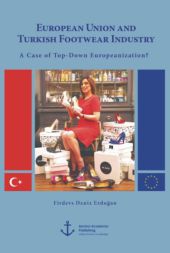 Neuerscheinungen 2014Stand: 2020-02-01 |
Schnellsuche
ISBN/Stichwort/Autor
|
Herderstraße 10
10625 Berlin
Tel.: 030 315 714 16
Fax 030 315 714 14
info@buchspektrum.de |

Firdevs Deniz Erdogan
European Union and Turkish Footwear Industry: A Case of Top-Down Europeanization?
Erstauflage. 2014. 84 S. 220 mm
Verlag/Jahr: ANCHOR ACADEMIC PUBLISHING 2014
ISBN: 3-9548931-2-6 (3954893126)
Neue ISBN: 978-3-9548931-2-6 (9783954893126)
Preis und Lieferzeit: Bitte klicken
In this research, European footwear industry and its interaction to Turkish footwear industry will be analyzed in the context of Turkey-EU relations. Main target is to frame the impacts of relevant policies implemented to Turkey in its accession process to the European Union and assess the possible outcomes by seeking an answer to the question whether if the legal framework of this industry is being shaped from a top-down approach under the EU directives.
Text Sample:
CHAPTER 2A: TURKEY AND EUROPEAN UNION:
This chapter will discuss the relations between Turkey and the European Union. From EU s inception and Turkey s first application to the current status and situation of the negotiation of the accession process.
2A.1 Historical Glimpse:
In an official statement by the Turkish government, they regard Europe as their common home that they have built by uniting around common norms, principles and values Today, a full account of the history of Europe cannot be made without analyzing the significant role that Turkey played in the Continent.
The Turkish-EU relations began with the application of Turkey for membership in the former European Economic Community (EEC) in 1959. She was an associate member of the Community, with the potential of becoming a full member at a future date. In 1963, Ankara Agreement was established in order to fully acknowledge the final goal of membership which constituted legal basis and arrangement. Ever since, Turkey has been knocking on the EU s door and thus has been waiting as a candidate country longer than any other outsider.
In April 1987, Turkey applied for full membership in the EU, but was rejected on the grounds that Turkey was not ready for the membership. Turkey tried again at the European Summit Meeting in Helsinki in December 1999. Finally, on October 3, 2005 the EU decided to begin the accession negotiations with Turkey under tough conditions.
According to Yilmaz, one of the main arguments against Turkey s membership is the claim that it represents cultural, religious, and mental otherness . The argument that European culture is based upon a Judeo-Christian identity and a heritage leading back to Greek, and Roman civilization implicitly argues that Turkey has no place in the European Union.
In addition to the disagreements is the demographic issue where Turkey is comparable with the population size of Germany, where it has a young population (i.e., there is a high fertility rate compared with most of the European countries). It will also make a dominant figure in the decision making processes because Turkey holds a substantial population which gives them more seats in the parliamentary and other institutions of EU.
Another issue is when the EU immediately accepted the Greek-part-of-Cyprus and did not wait for the outcome of proposed United Cyrus Republic under the Kofi Annan plan in 2004. It exacerbated the conflicting tension in Turkey s accession membership process particularly on the agreed Customs Union between them, which Turkey did not comply on some of its provision by rejecting to open its ports to Greek Cypriots ships and planes. Therefore, EU forcefully closed most of the chapters in the communautaire acquis in the negotiation table, which prolonged the length of the accession process.
F. Deniz Erdo an was born in 1986 in Bursa, a city located in northwest of Turkey. She is a very successful independent shoe entrepreneur and founder of a Turkish brand shoe enterprise called ´Oi Arte´ including a beauty salon ´Barbizon´. She recently earned her MA degree in International Relations from the Middle East Technical University, the premier and top university of Turkey, in 2013. She also attended a summer school on political philosophy at Yale University in 2000. Before becoming a businesswoman, she was a researcher at the European Research and Implementation Center in Ankara University in 1991. She earned her business degree from Uluda University in 1989, and went to American High School in Belgium (1979-82) and Atatürk Anatolian High School in Ankara (1982-85) for secondary education.


